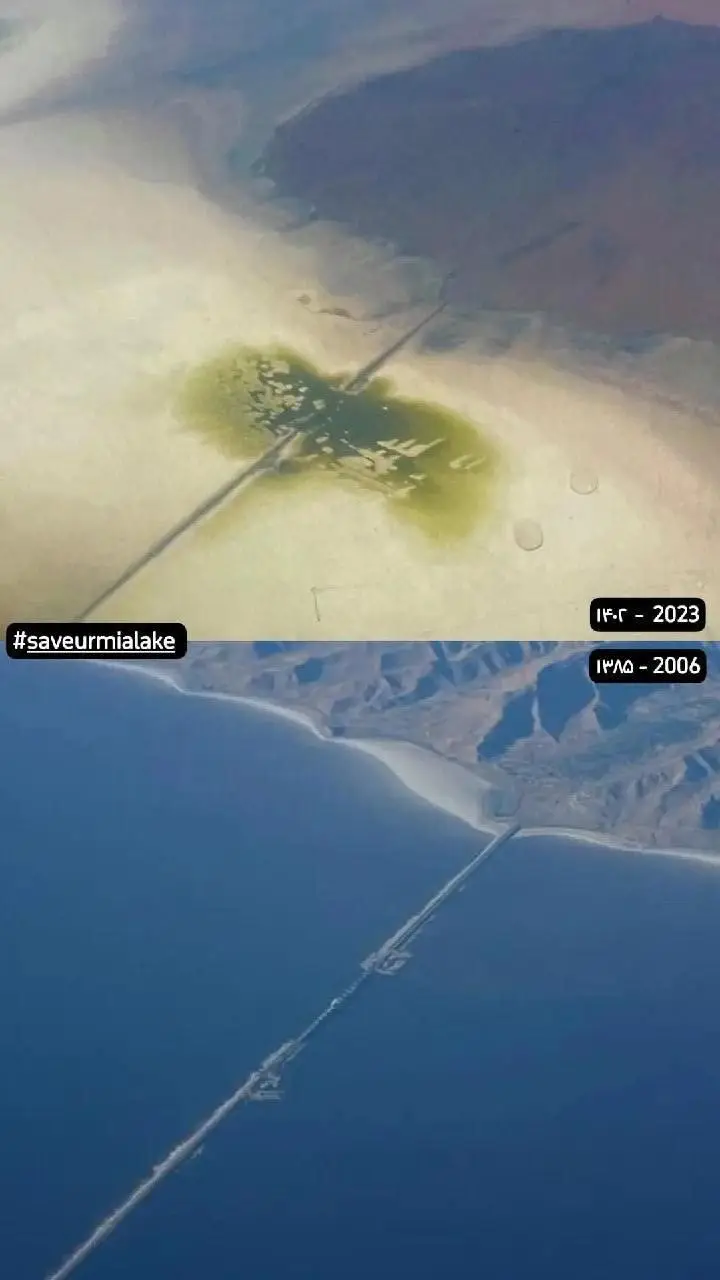iranintl – Water management researcher Aida Tavakoli calls the current condition of Lake Urmia “an ecological disaster” as the Middle East’s once second largest lake disappears.
Tavakoli blamed the shrinking on several factors including mismanagement, drought, and increased water diversion for irrigated agriculture within the lake’s watershed.
“Like all totalitarian regimes, food self-sufficiency has been a core priority of the Islamic Republic’s ideology. Regardless of the precarious hydrography of the country, the regime multiplied projects that diverted water from the rivers feeding Lake Urmia, taking more than half of its inflow to irrigate agricultural lands,” she went on to say.
In late March and early April 2019, 26 of Iran’s 31 provinces were affected by flooding from the rain and the seasonal melting of snow cover in the mountains. The rains were reported to be the heaviest Iran had seen in 50 years. The unprecedented phenomenon raised hopes for the restoration of Lake Urmia as its depth increased by 62 centimeters (24 inches) compared to the spring of 2018. However, the positive impact of the heavy rains did not last long.

Referring to the incident, Tavakoli stressed that seasonal rainfall alone cannot save Lake Urmia and a profound change in water management policies is necessary.
“The increased salinity caused an alteration of local climate which induced an acceleration of water evaporation. In addition, the water diversion projects have proliferated, which did not allow for this temporary return of water to last more than a few months,” she stated.
In a report released in October, 2023, NASA Earth Observatory confirmed that most of the basin of Lake Urmia was filled with water in September 2020 subsequent to a period of above-average precipitation. Despite this phenomenon, “the longer-term trend for Urmia has been one toward drying” as a result of “consecutive droughts, agricultural water use, and dam construction on rivers feeding the lake,” NASA Earth Observatory added.
Meanwhile, an Iranian official said on Thursday that Lake Urmia has completely dried up and the calls for its revival are “unrealistic.”
“The lake has no water anymore and there is nothing in its bed but salt and dust,” Ahad Vazifeh, head of the National Center of Climate and Drought Crisis Management, told Rouydad24 news website. He warned that what has befallen the lake will have “dangerous repercussions” for the region. If the lake bed remains dry, it can turn into a source of dust which can affect the whole region.
The main cause of the disappearance of Lake Urmia was the indiscriminate drainage of its water supplies, stressed Vazifeh, noting that no practical step has been taken to revive the lake.
In April 2023, NASA MODIS warned of the “tragic” consequences of the complete loss of the lake: “The mineral crust and bottom sediments contain not only salt, but heavy toxic metals used in industry and toxic agricultural substances. As the lakebed is exposed and desiccated, these may become airborne and pose a risk to the environment and people.”
Located between the provinces of East and West Azarbaijan provinces in northwestern Iran, Lake Urmia was the second largest lake in the Middle East and the sixth-largest saltwater lake on Earth with an original surface area of 5,200 square kilometers in the 1970s, or 2,000 square miles.
Back in November, Iranian daily Etemad reported that the lake retains only four percent of its water, which means that it is dead.
Iran Briefing, a group of investigative journalists, speculated in December that authorities have been mining titanium, present in Lake Urmia, which could explain why the once thriving salt-lake has dried up.
Several videos were also released of trucks allegedly carrying titanium around the lake. The Urmia region possesses a titanium mine and magnesium recovered from lake brine can be used to refine it.
Some experts have also ruled out the possibility of reviving the lake which has been illegally salt mined for years, with rumors last year of lithium mining. “It is not in the government’s interest, will, or power to revive Lake Urmia,” Roozbeh Eskandari, a hydraulic structures and dam construction expert, told Iran International.
Iran’s Environment Department has dismissed reports of lithium extraction from Lake Urmia and the alleged involvement of China in it. The Director of Environmental Protection in West Azarbaijan, Saeed Shahand, claimed that the activities in question solely pertain to “salt extraction, not lithium.”
 Shabtabnews In this dark night, I have lost my way – Arise from a corner, oh you the star of guidance.
Shabtabnews In this dark night, I have lost my way – Arise from a corner, oh you the star of guidance.



